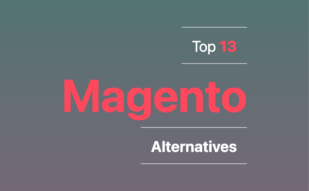Adobe Commerce entered the ecommerce market by acquiring Magento Commerce in 2018. It offers a fully managed, cloud-based platform that integrates with various Adobe Experience Cloud tools. The platform, used by major companies like Coca-Cola and Nike, powers over 141,800 websites globally.

For those exploring alternatives to Adobe Commerce, options include Magento, WooCommerce, Shopify, PrestaShop, OpenCart, Drupal, WordPress, Laravel.
Magento
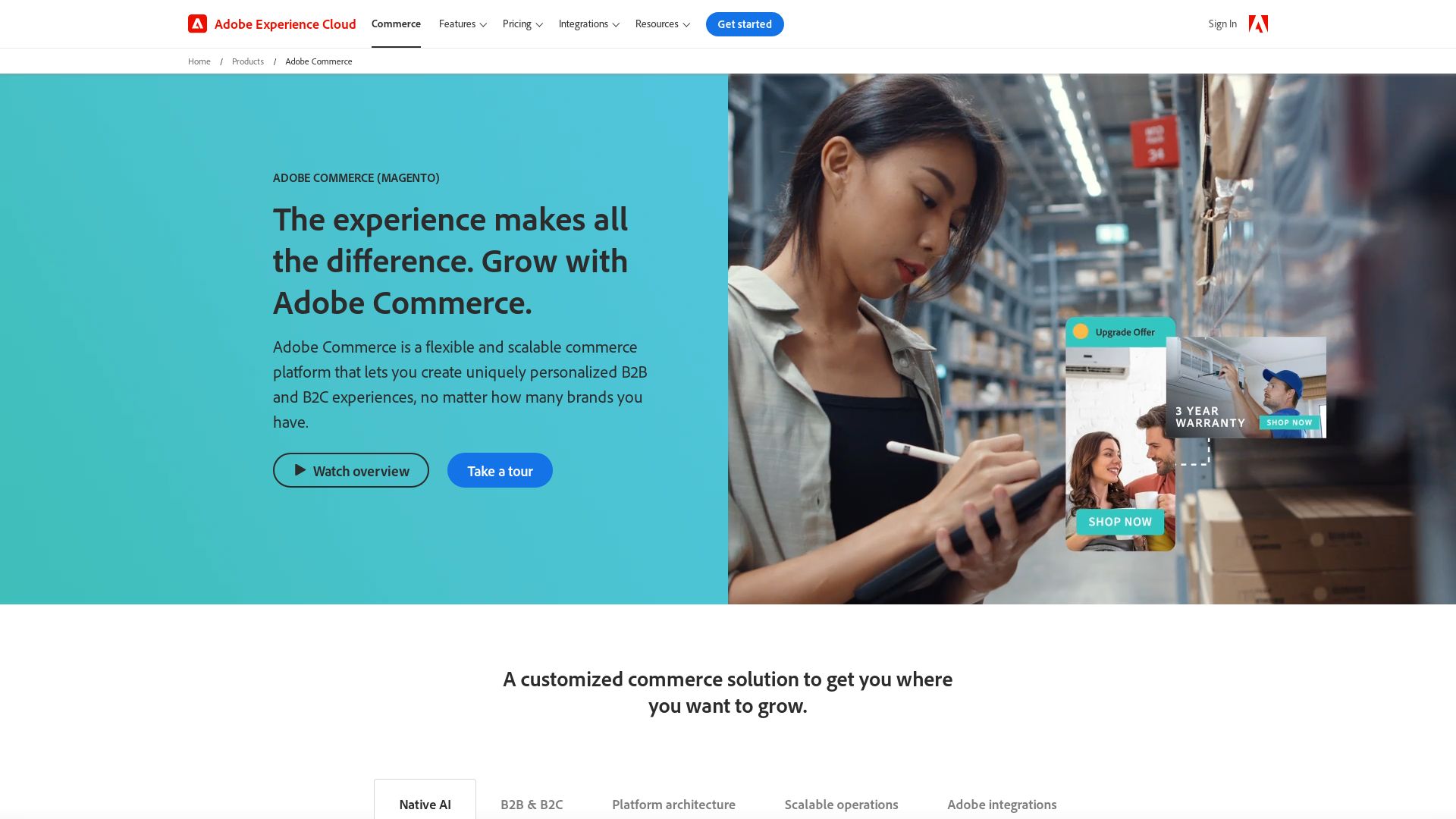
As an open-source ecommerce platform with its launch dating back to 2008, Magento has garnered the trust of over 250,000 global merchants, commanding approximately 30% of the total market share in its sector.
Magento Top Features
- Flexibility: With three specialised editions, tailored for businesses of varying sizes and specific needs, Magento displays its adeptness in addressing various user preferences.
- Comprehensive eCommerce tools: Magento provides an all-encompassing eCommerce solution. Through their in-built features, users can set up and effectively grow their eCommerce business.
- Community support: Backed by a robust user community, Magento offers a platform for knowledge sharing and problem-solving.
| Magento Edition | Best Suited For |
|---|---|
| Magento Open Source | SMBs |
| Magento Commerce | Businesses with large product catalogs |
| Magento Commerce Cloud | Large scale businesses seeking advanced functionalities |
Magento Disadvantages
- Magnitude of Complexity: Magento is comparatively harder to use than alternatives like Shopify, especially for businesses making their initial foray into eCommerce.
- Cost Variables: With fluctuating costs, businesses might face difficulties in financial forecasting and budgeting.
Magento Pricing
Magento’s pricing varies depending upon the chosen edition, ranging from variable costs associated with Magento Open Source to licensing costs running between $22,000 and $125,000 annually for Magento Commerce. Hosting charges, costing from $100 – $500 yearly, apply separately for self-hosted community edition.
Magento Use Cases
Use Case 1: Small to Medium Businesses
With its cost-effective Open Source edition, Magento aids SMBs in accessing solid and comprehensive eCommerce tools, fostering their business growth.
Use Case 2: Established Businesses
Businesses with large product catalogs benefit from Magento Commerce’s superior speed and performance enhancements, providing powerful shopping experiences to customers.
Use Case 3: Large Scale Businesses
Larger businesses prefer the Magento Commerce Cloud for its advanced functions, robust security, and ability to comply with PA-DSS to safeguard customers’ vital information.
.
WooCommerce
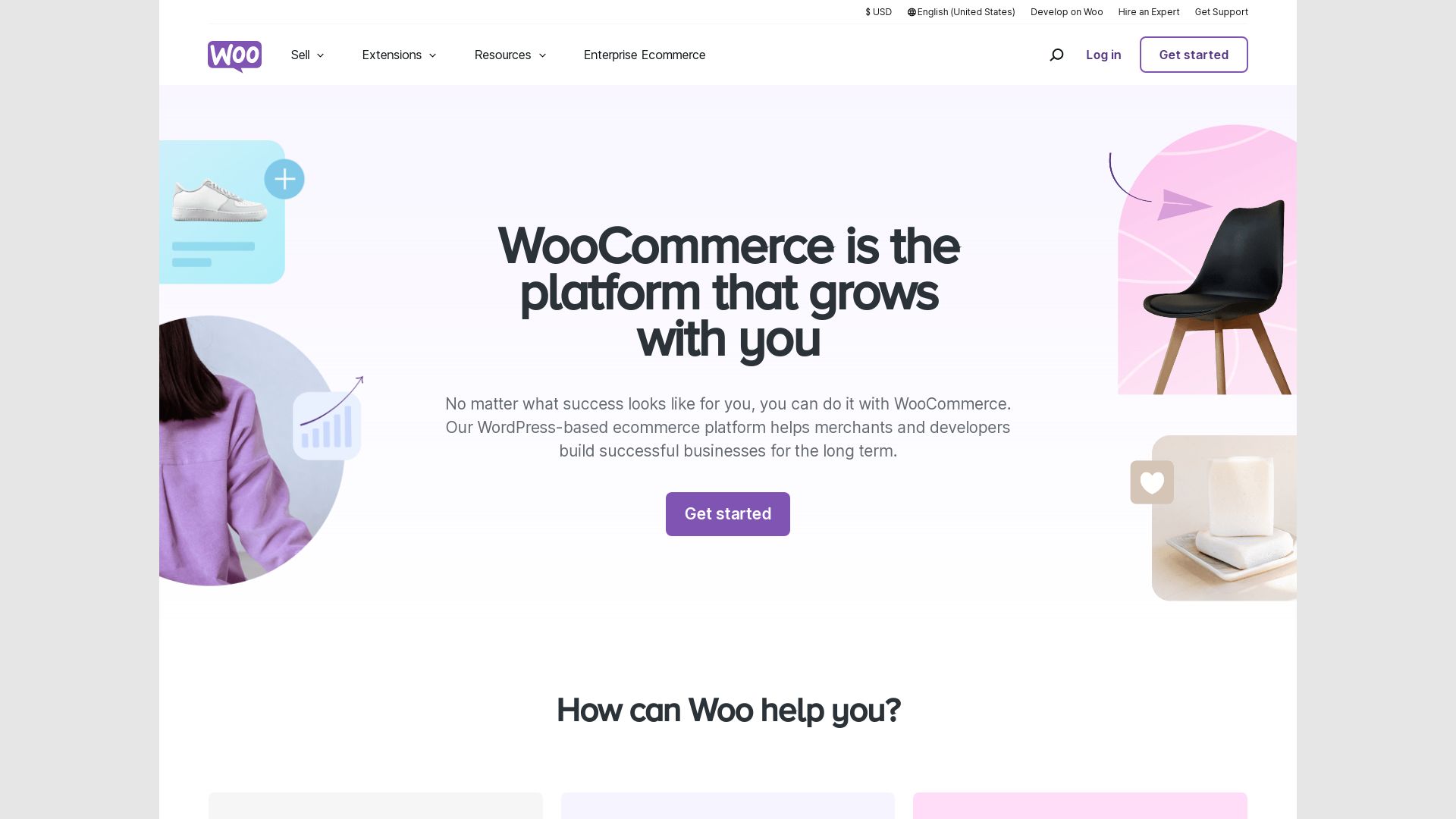
WooCommerce is a user-friendly, robust, and flexible open-source ecommerce platform. Built on the WordPress foundation, it specializes in facilitating the creation of aesthetically pleasing online stores while offering superb user experience.
Best Features of WooCommerce
- Fully customizable with mobile-ready designs
- Seamless integration with 140+ payment gateways
- Superior inventory and order management systems
- Effective lead capture and live chat facilities
- Remarkable conversion tracking and SEO capabilities
- Excellent social media integration
| Fact | Description |
| WordPress Readiness | WooCommerce can easily convert any existing WordPress website into an online store. |
| Secure Payment Portals | It ensures secure transactions with multiple payment options. |
| CMS capabilities | Its strong content management system optimizes the user experience. |
WooCommerce Limitations
- It’s primarily compatible only with WordPress websites.
- Large volume customization can become complex.
WooCommerce Pricing
As an open source platform, WooCommerce can be utilized free of cost. Special features, and customization, however, may have varying associated costs.
WooCommerce Use Cases
Use case 1: Small to Medium-sized Businesses
With its user-friendly interface and flexibility, WooCommerce is an excellent choice for small to medium-sized businesses looking to establish online stores.
Use case 2: Large Volume Stores
For larger businesses requiring advanced customization and robust functionality, WooCommerce & TheeDigital can ensure ecommerce success through strategic setup and optimization.
Use case 3: WordPress Users
Existing WordPress users seeking to convert their website into an ecommerce platform will find WooCommerce the most compatible and convenient choice.
Shopify

Presenting Shopify, an eCommerce platform that offers feature-rich and affordable solutions for your online shop with myriad customizable templates.
Shopify Top Features
- Wide array of pre-made and cost-effective templates.
- Potential for unique aesthetics through brand-centric design modifications.
- Ongoing SEO optimization, driving 43% of your sales from search engines.
| Custom Functionality | Shopify allows integration with custom ERP or CRM systems, bolstering your eCommerce platform’s efficiency. |
| Various Page Designs | Shopify caters to your unique page templates need, including product pages, blog pages, and category pages. |
| Store Designs | Most established Shopify stores leverage custom-designed themes for a distinctive look. |
Shopify Limitations
- Lack of Shopify’s in-house custom design service, necessitating third-party design help.
- Elements like custom functionality and individual page designs can substantially add to the overall cost.
Shopify Pricing
Shopify runs on a monthly subscription of $29.99-$299.99. The cost could go higher when considering theme/template costs, custom Shopify website design fees, and extra functionality development rates. The full Shopify store design expenses could range between $5,000 to $20,000 or even exceed $100,000 in extensive projects.
Shopify Use Cases
Use Case 1
If you are venturing into eCommerce with limited budget and time, Shopify’s Accelerator Programme by Eastside Co enables you to launch a store in under four weeks, quickly getting your brand in front of consumers.
Use Case 2
For established businesses, Shopify’s integration with custom ERP and CRM systems streamlines store operations and enhances eCommerce efficiency.
Use Case 3
Shopify is ideal for businesses prioritizing user retention and engagement with features such as search functionality, promotion and discount tools, carousel slides, mega menus, newsletter sign-ups, related items, wishlist creation, and product reviews.
PrestaShop
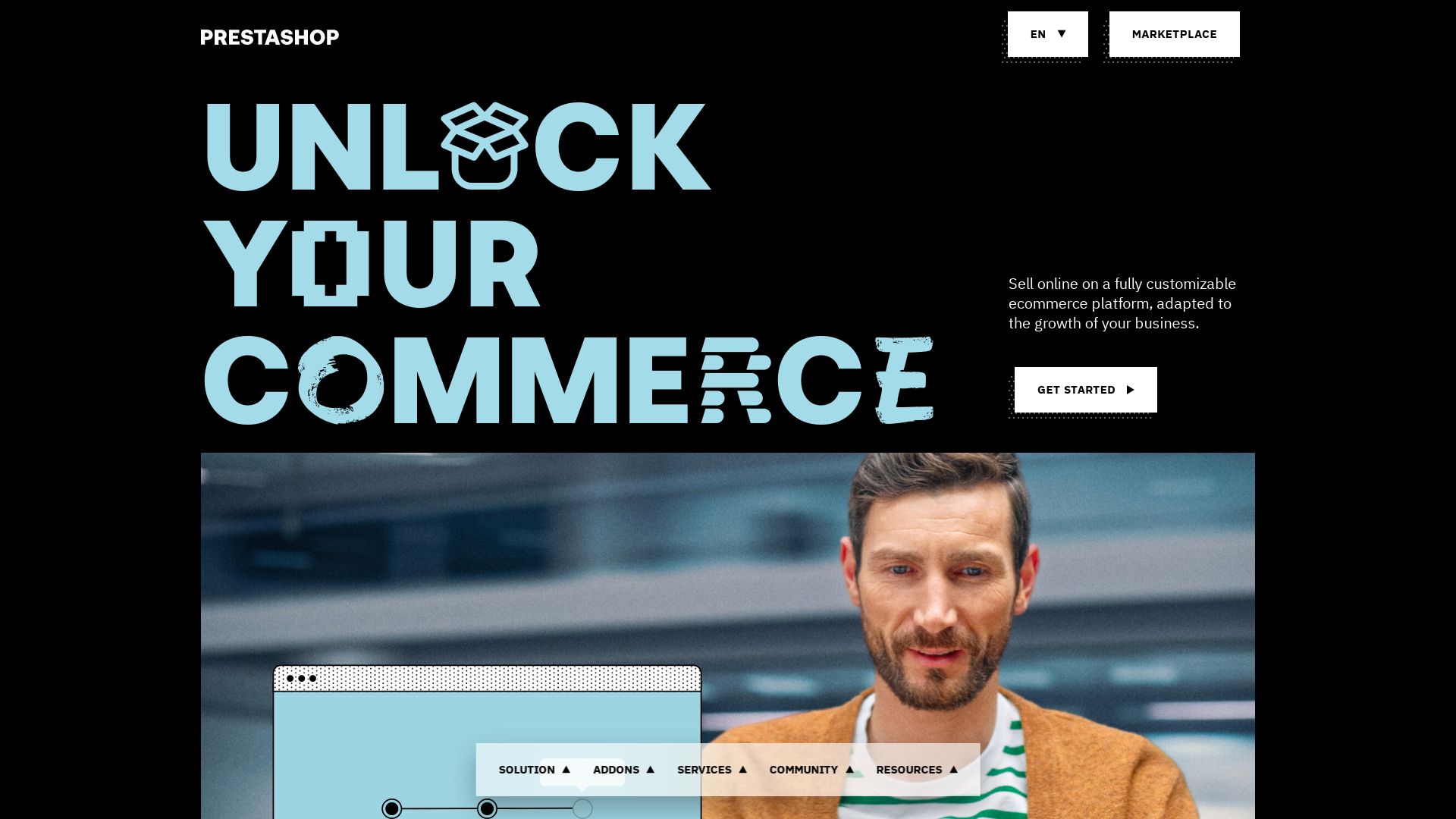
Unveiled in 2005, PrestaShop stands as an open-source eCommerce solution that empowers businesses worldwide. Rendering full ownership and scalability, it delivers flexibility for growth from fledgling revenues to millions.
Best Features of PrestaShop
- Customizable Themes: Modify your online aesthetic with limitless creative options.
- Add-On Modules: Extend functionalities with PrestaShop’s numerous add-on modules.
- Translation: Break the language barrier with provision for 75 languages.
- Multiple Payment Options: Democratize transactions with diverse payment methods.
- Security: Secure transactions via protocols such as SSL and HTTPS.
| Feature | Description |
|---|---|
| SEO-Friendliness | Boost your online visibility with built-in SEO tools. |
| Mobile-Friendly Design | Engage mobile users with adaptable interface. |
| Admin Capabilities | Manage inventory, SEO, promotions, and advanced navigation. |
Limitations of PrestaShop
- Additional costs that accrue over time.
- Module incompatibility issues can emerge.
- Developer skills are crucial for effective usage.
PrestaShop Pricing
The advantage of PrestaShop lies in its open-source nature, meaning it is completely free to use. However, optional add-ons may induce additional costs.
PrestaShop Use Cases
Retail Stores
PrestaShop aids small to large retail stores like Parisian success story, Les Raffineurs, in boosting their global reach.
eCommerce Start-Ups
Start-ups can utilize PrestaShop’s scalability feature to grow revenue from hundreds to millions.
Global eCommerce Giants
Major global retailers leverage PrestaShop’s multi-store management and wide language support to enhance their global footprint.
OpenCart
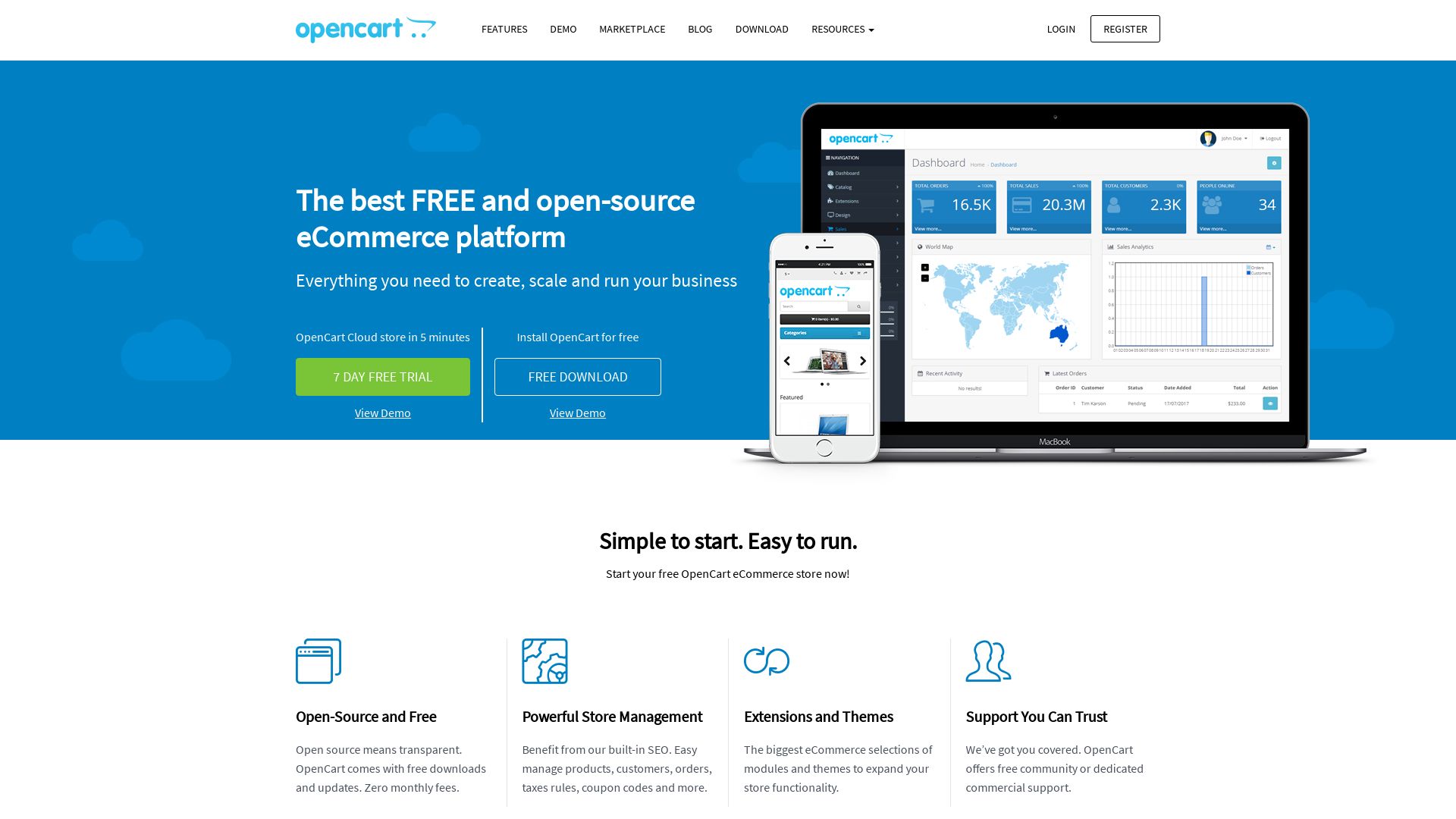
Crafted by Daniel Kerr, OpenCart is a free, open-source e-commerce platform. With roughly 292,051 live websites currently relying on it, the platform shines with its customizability and an array of features ideal for businesses having elementary expertise in web development and design.
OpenCart Top Features
- Modification favorability: enables source code tweaks for store customization.
- Admin Dashboard: useful for performance analysis and for the distinct role of user access for online store control.
- Comes with essential online store features like Discounts, Coupons, and Specials; allows unlimited products and categories.
- Excellent SEO optimization and mobile-responsive design by default.
- Supports multiple payment processing providers free of extra charges.
| Key Features | Details |
| Unlimited Categories | Allows organization of larger product portfolios |
| Multi-Currency & Multi-Language Support | Facilitates operations across borders |
| Printable Invoices | Easy generation and printing of bills |
OpenCart Limitations
- Requires technical knowledge for performance optimization.
- Limited functionality without extensions; some may fail to perform correctly.
- Not suitable for larger online stores requiring high-end functionalities.
OpenCart Pricing
OpenCart is free to use; costs are incurred only for hosting and any additional extensions.
OpenCart Use Cases
Startups
OpenCart is an effective choice for startups due to its cost-effectiveness and simple setup, enabling quick online venture launch.
Small to Mid-scale E-commerce Businesses
With its scalability and adaptability to multiple payment gateways, OpenCart is an ideal solution for small to mid-scale e-commerce businesses desiring growth.
Single or Multiple Retail Platforms
OpenCart comes handy for managing online stores, single or multiple, simultaneously.
Drupal
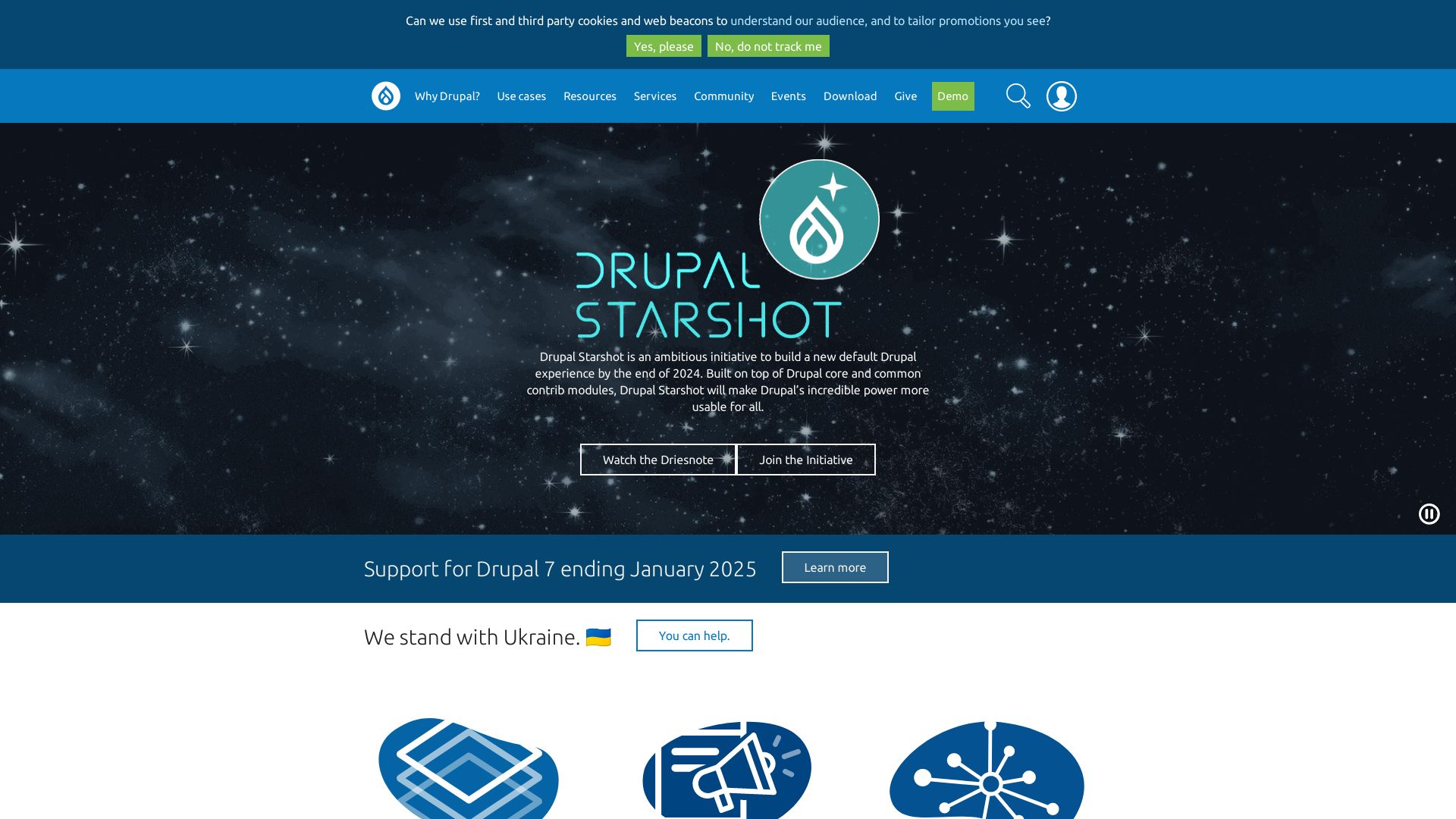
Introducing Drupal, a powerful open-source eCommerce framework, designed to accommodate traditional eCommerce needs alongside the capability for customizing complex eCommerce and community websites. Its reliable international appeal lies in its support for global currency, taxes, and languages.
Drupal Best Features
- Customization capabilities: Capable of facilitating custom REST resources via JSON:API, fulfilling enterprise-level customization requirements.
- Responsive design: Enables the creation of fully mobile-ready eCommerce sites—optimal for diverse platform usage.
- Community support: Driven by a sizeable community of over 45,000 developers, ensuring continuous innovation.
- API-First Initiative: Enhances power and flexibility, making Drupal accessible over HTTP APIs to languages like Python, PHP, Java, or Go.
| Essential Modules | Use Case |
|---|---|
| Ubercart | Offers a fully integrated suite for eCommerce. |
| Drupal Commerce | Provision for comprehensive eCommerce needs. |
| DrupalPartners | Fulfilment of CMS, eCommerce platform development, and full website maintenance. |
Drupal Limitations
- Development complexity is high, demanding professional expertise for setup.
- Varying cost range considering the scope of the website and customization needs.
Drupal Pricing
Drupal boasts an open-source nature but the cost of developing a new eCommerce website with Drupal varies. A basic Drupal Commerce website costs between $20,000-$40,000 while a custom Drupal Commerce website lies in the $50,000-$100,000 bracket. The price hinges on regional differences, required customization, site size, and overall complexity. Note that additional professional support may incur additional costs.
Drupal Use Cases
Use case 1 – Complex eCommerce Sites
Drupal’s robust customization options are a perfect match for large eCommerce operators seeking complex site development.
Use case 2 – Rapid Business Growth
The open-source framework adapts neatly to the requirements of dynamic businesses needing fluid scalability.
Use case 3 – Global Operations
Drupal’s international support for currency, tax, and language makes it ideal for businesses with a global consumer base.
WordPress
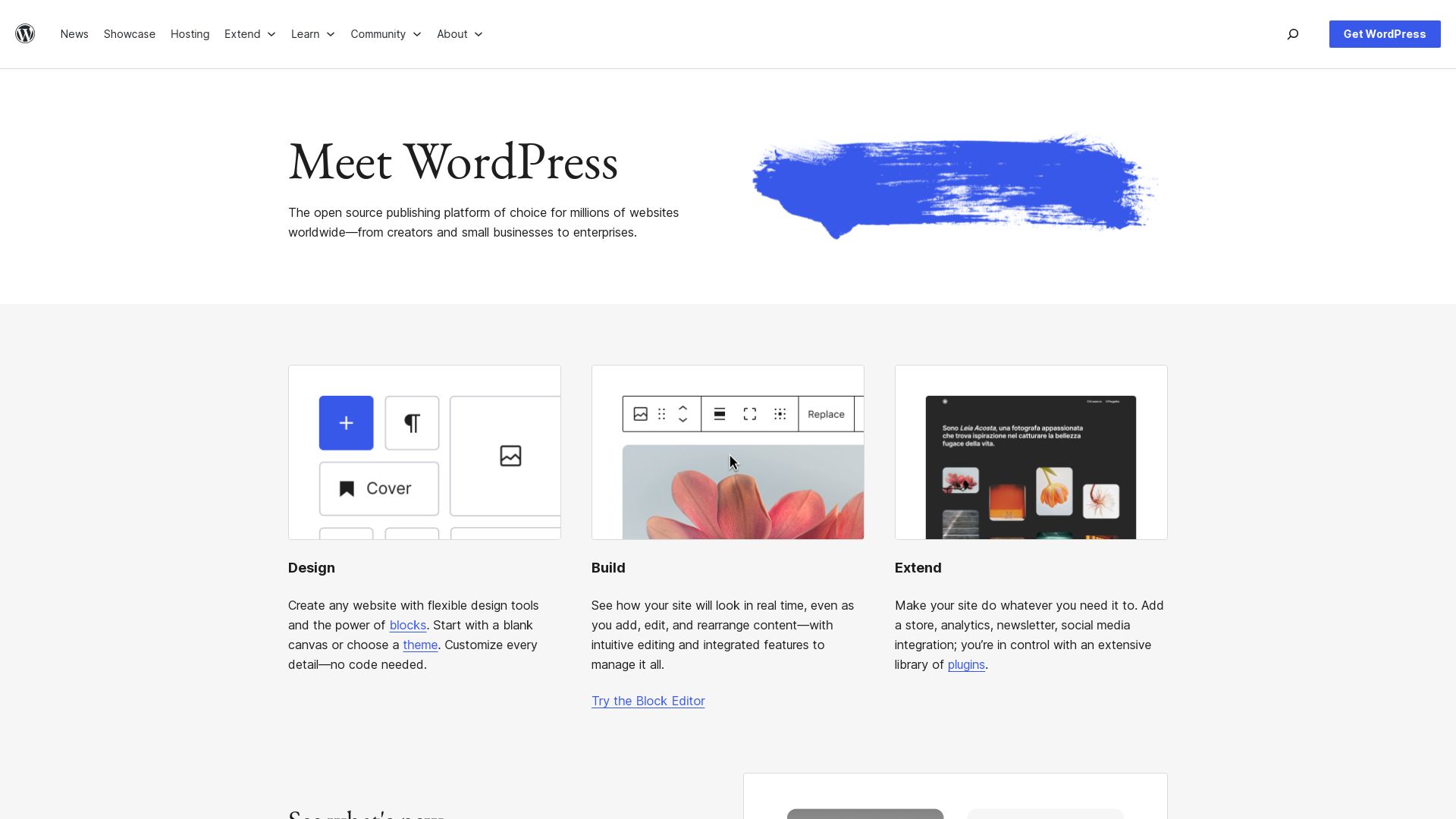
Playing host to over 40% of the digital universe, WordPress—a forerunner in the Content Management System (CMS) division—crowns with a 64% CMS market share. However, to turn its prowess in CMS into an ecommerce titan, WordPress teams up with the WooCommerce plugin.
WordPress Top Features
- WooCommerce: Open-source and customizable, this plugin transforms WordPress into an eCommerce jugernaught.
- SEO Services: WordPress teams up with Yoast SEO to ensure your site’s SEO-friendly architecture.
- Theme Versatility: Over 1,200 eCommerce-oriented WordPress themes breathe life into your online store.
- Additional Add-Ons: Booking, upselling, and pre-ordering—there’s an arsenal of plugins ready to enhance your online presence.
| Payment Extensions | Unique Service Features |
|---|---|
| WooCommerce Payments; Stripe; PayPal; Afterpay; Authorize.Net; Square; Amazon Pay | Automated payments; Premium newsletter content for users; Unlimited pages, users; Reduced third-part billing; Automated updates |
WordPress Disadvantages
- Plug-In Pitfalls: Despite the vast selection, occasional compatibility issues may arise.
- Ecommerce Novice: WordPress is a CMS virtuoso, but its ecommerce functionality leans heavily on WooCommerce.
- Customization Cost: While the base is free, tailor-made design starts at $1,000.
WordPress Pricing
With the core platform being free, WordPress becomes cost-effective. However, exclusive branding comes at a price—with custom development starting at $25,000. Marketing services hover around $250-$5000 per month, and hosting costs are a modest $20 average monthly. Pair those with transaction fees from WooCommerce and Paypal of 2.9% + $0.30 per transaction, and the costs start to add up—but still, the scalability remains unmatched.
WordPress Use Cases
Small Businesses
With pocket-friendly hosting costs and WooCommerce at your disposal, small businesses find a convenient springboard.
eCommerce Ventures
Armed with WooCommerce, embarking on your eCommerce journey becomes an effortless affair on WordPress.
Blogs and Personal Websites
With an array of custom themes and unrestricted pages, WordPress emerges as an author’s best friend.
Laravel
A paradigm in the world of eCommerce and an embodiment of the future, Laravel, a PHP framework, spins a network of elegance, security, and scalability to cast impactful websites. A robust framework sought by fledgling startups and top-notch businesses alike, boasts an impressive 35.87% market share amidst PHP frameworks.
Laravel Top Features
- Scalability: Laravel’s design inherently adapts to your business growth, making it suitable for all sizes.
- Expressive Syntax: Laravel emphasizes on writing clear and expressive code, paving the way towards efficient production.
- Security: Boasting high-level security measures, Laravel shields sensitive customer data against common vulnerabilities.
- Community Support: With a vigorous community providing the vital support, there’s no obstacle that can’t be overcome.
- Pre-installed Libraries and Packages: These ancillaries guide you in developing modern, comprehensive eCommerce sites.
| Feature | Description |
|---|---|
| Built-in tools: | Artisan command-line interface and Laravel ecommerce plugins spawn an environment conducive to creativity. |
| Custom Web Application Development Provision: | Laravel adapts itself for customizable web application development. |
Laravel Limitations
- No direct limitations mentioned. However, since Laravel is robust and sophisticated, it might pose higher learning curves for beginners.
Laravel Pricing
Laravel is an open-source framework, hence it is completely free of cost, albeit it’s advisable to hire professional Laravel developers for comprehensive and complex eCommerce site development.
Laravel Use Cases
Use Case 1: eCommerce Websites
Laravel’s high scalability, server-side and application-side security features make it an excellent choice for both big and small online businesses looking to build user-focused eCommerce stores.
Use Case 2: CRM, LMS, HRMS Systems
Laravel elegantly handles the backend of complex systems such as CRM, LMS, and HRMS, amalgamating robustness with versatility.
Use Case 3: Rapid Site Development
With ready-to-use libraries and built-in tools, Laravel supports rapid site development, significantly reducing redundant coding times.
Patrick Daugherty
Content writer @ Aircada. Merging AR expertise with a love for late-night gaming sessions.





